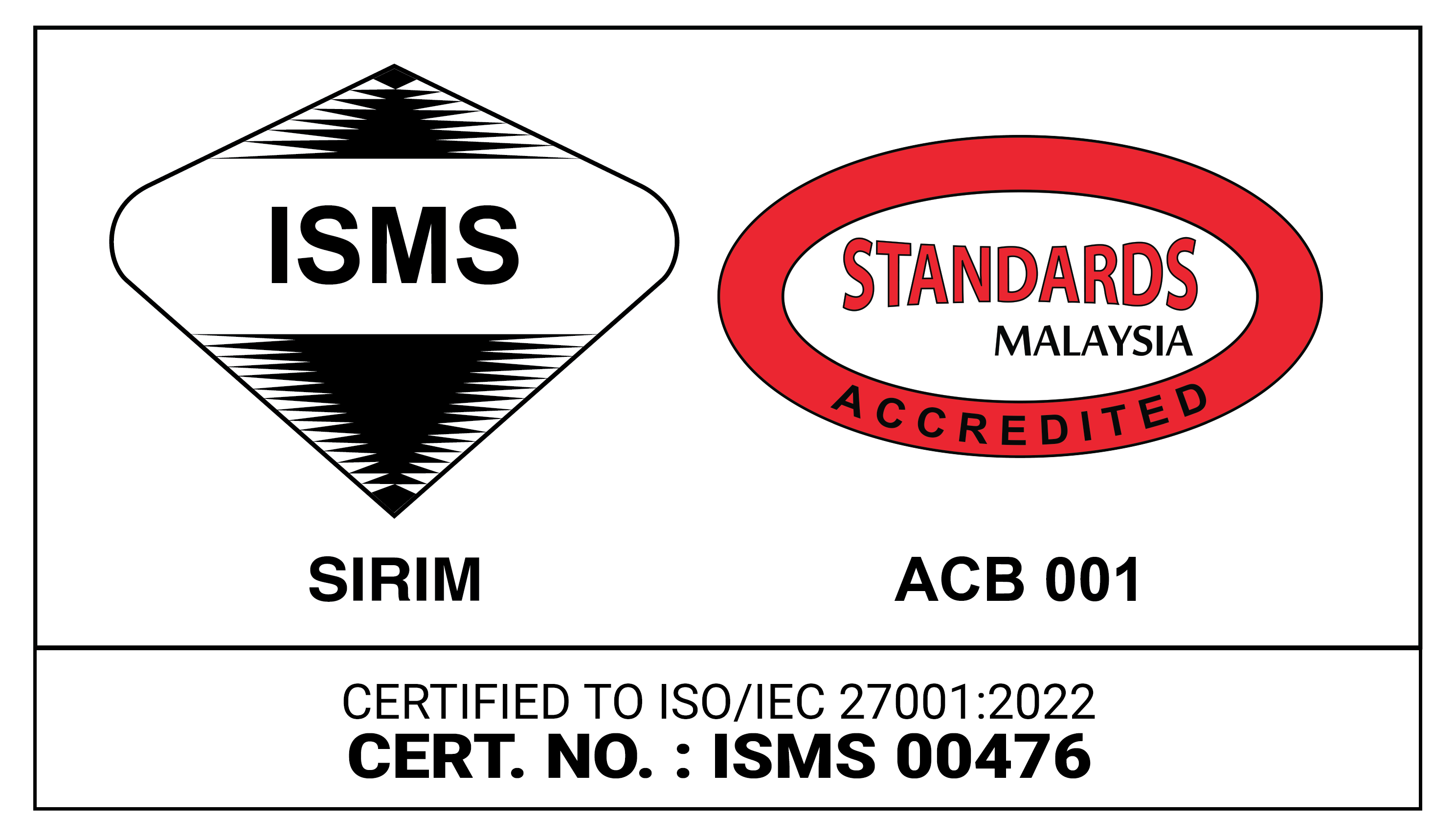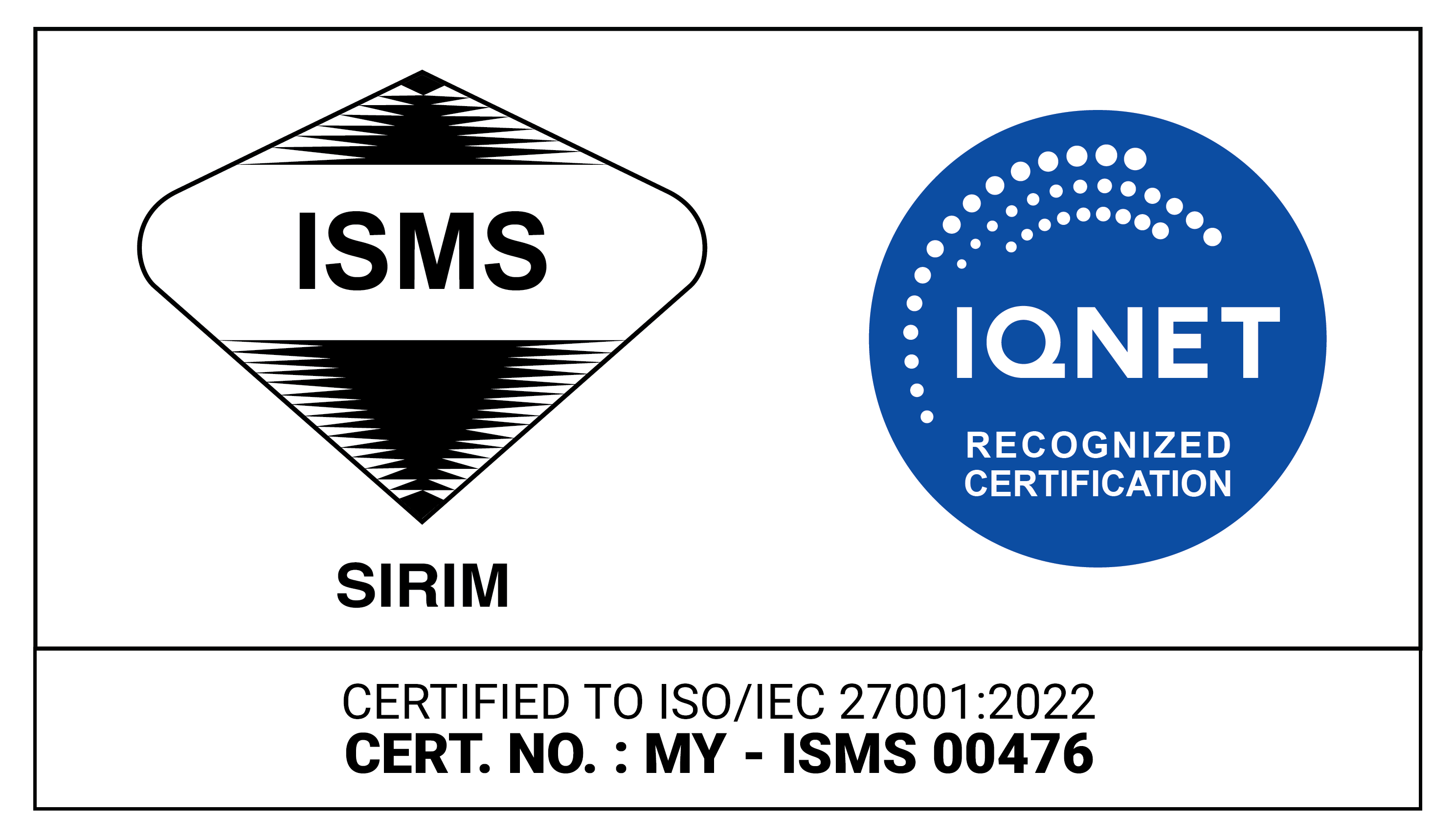The cocoa industry contributeed RM1.64 billion to GDP in 2020. In the first half of 2021, the cocoa industry contributed RM0.85 billion to GDP. The coca plantation area in 2021 is 5,955 hectares with the production of 361 tons. Malaysia is one of the largest cocoa bean processing and grinding center, ranked sixth in the world. Malaysia's cocoa bean grinding target in 2021 is 335,000 tonnes.
Malaysia’s cocoa-based products grown rapidly in the global market and have extensive market coverage to more than 100 destinations worldwide. Export revenue from cocoa and cocoa -based products amounted RM6.29 billion in 2020. In the first half of 2021, export revenue from cocoa stands at RM3.37 billion. Cocoa butter remained the major contributor of total export earnings at 37.2% followed by cocoa powder (23%) and re-export of dried cocoa beans (17.3%).
In 2021, there are 53 chocolate and confectionery companies in Malaysia and 232 chocolate entrepreneurs registered with the Malaysian Cocoa Board. In overall, the net exports of the chocolate industry contributed RM0.49 billion as at June 2021.
PROGRAMME & INCENTIVE
Subsidy Assistance/Program (Financial/Non-Financial Incentives & Tax) for Cocoa Industry
Types of Incentives / Assistance for Cocoa Industry
1. New cocoa plants
2. Cocoa Productivity Improvement (PPP) Program (One-Off )
3. MCB’s Handmade Chocolate Entrepreneur Development Program
NTERNATIONAL COLLABORATION
International Cocoa Organization (ICCO)
- Malaysia is a permanent member of ICCO and attends meetings held annually in accordance with the interests and functions of the organization to:
- promote the development and strengthening of international cooperation for the expansion of world cocoa trade;
- promote scientific research and development in the field of cocoa; and
- provide a forum to discuss matters related to the world cocoa economy
- Malaysia's presence as a member country in this ICCO Meeting is to keep update the latest developments in the world cocoa industry and ensure the interests of the country's cocoa industry not affected by the decisions made, while maintaining cooperation with other member countries. In addition, the appointment of Malaysia as a member of the ICCO Administration & Finance Committee ensure transparency in administration and finance matters in accordance with the rules set by member countries. Malaysia needs to continue to be represented in the upcoming ICCO meetings to ensure the continuity as an ICCO member country.
- Malaysia has been a member of ICCO since 1994 and renewed its membership as an ICCO producing country by signing and ratifying the 2010 International Cocoa Agreement on 5 August 2013 and 30 August 2013. Through the Ad Hoc Panel Meeting On Fine Or Flavor Cocoa from 8 to 13 April 2019 in Abidjan, Côte d'Ivoire and the 100th meeting of The International Cocoa Council And Its Subsidiary Bodies from 9 to 12 September 2019 in Abidjan, Côte d'Ivoire, Malaysia have the opportunity to maintain cooperation between cocoa producing and importing countries and follow the development of the world cocoa industry.
ASEAN Cocoa Club (ACC)
- Malaysia is the focal point for ASEAN Cooperation and Joint Approaches in Agriculture and Forest Products Promotion Scheme. This approach aims to collaborate and share technology transfer between ASEAN member countries with regional organizations as well as the private sector at the international level.
- The ASEAN Cocoa Club established based on the Memorandum of Understanding (MoU) of the ASEAN Cooperation and Joint Approaches in Agriculture and Forest Products Promotion Scheme signed by the ASEAN Agriculture Ministers in 1994. Through the MoU, 11 working groups were established, comprising working group in the cocoa, forestry and vegetable oil sectors. These working groups aim to explore markets at the international and ASEAN levels as well as resolve issues related to these products collectively.
- Following that, the ACC launched in July 1996, in Kota Kinabalu, Sabah with the membership of ASEAN countries namely Brunei, Cambodia, Indonesia, Laos, Malaysia, Myanmar, Philippines, Singapore, Thailand and Vietnam. The ACC meeting will involve parties deal with the cocoa industry such as cocoa growers, grinders, exporters, manufacturers, chocolate producers and cocoa products as well as the Government.
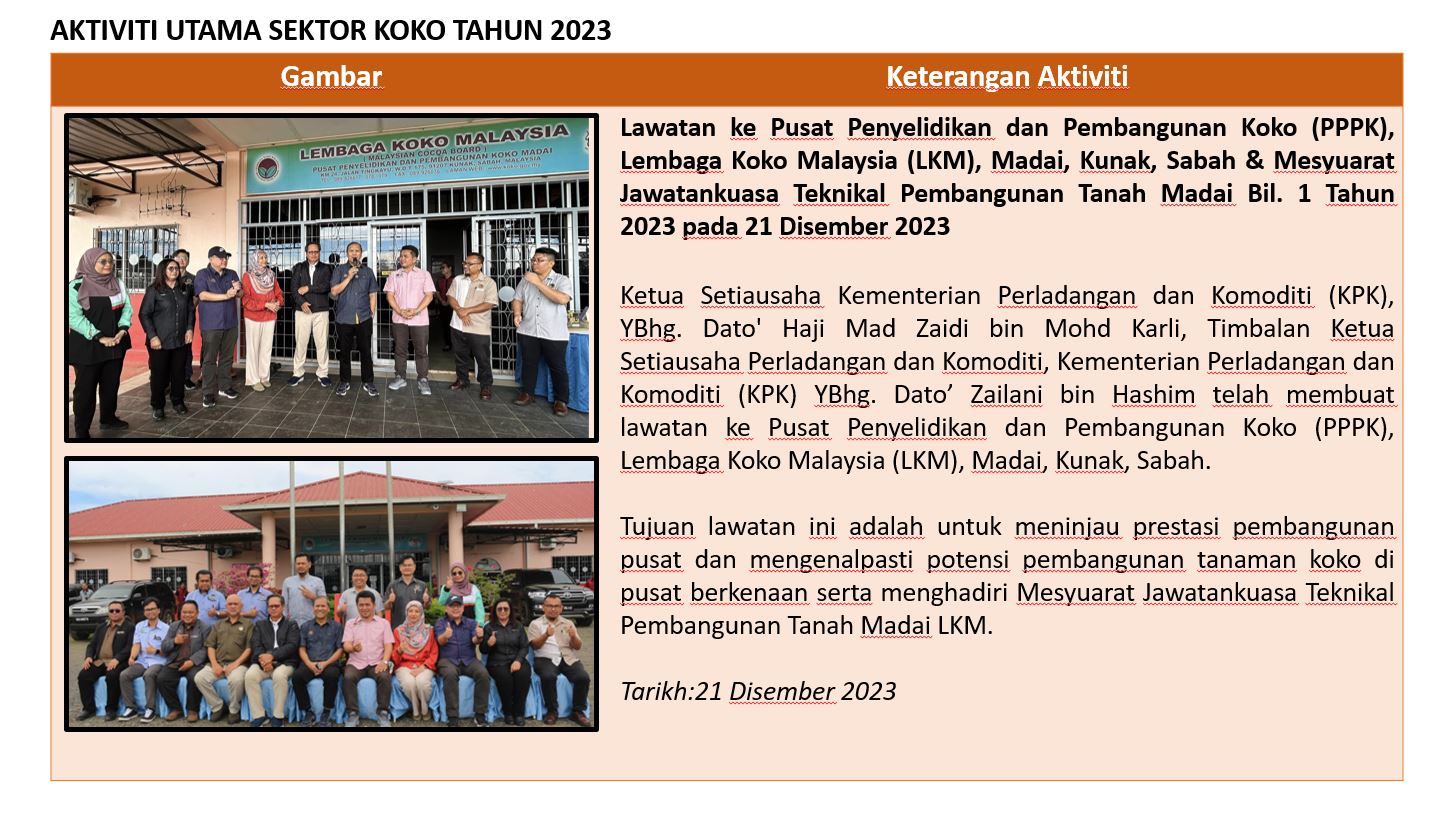
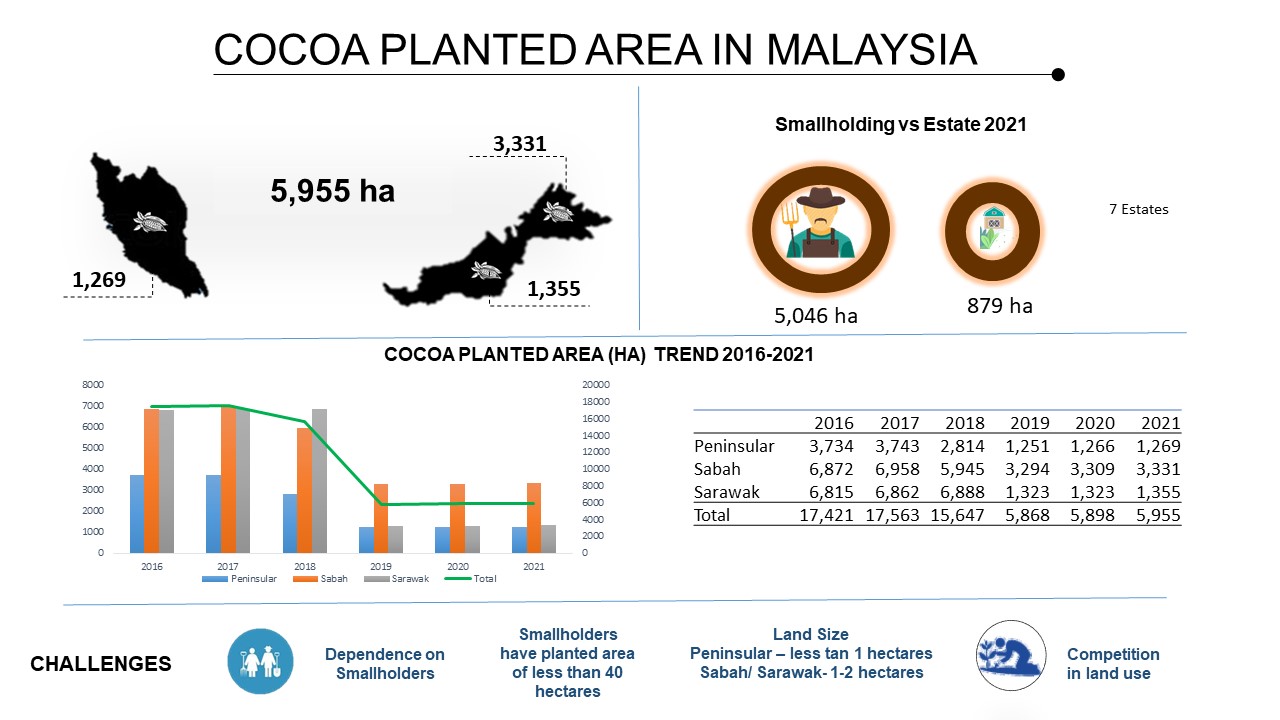
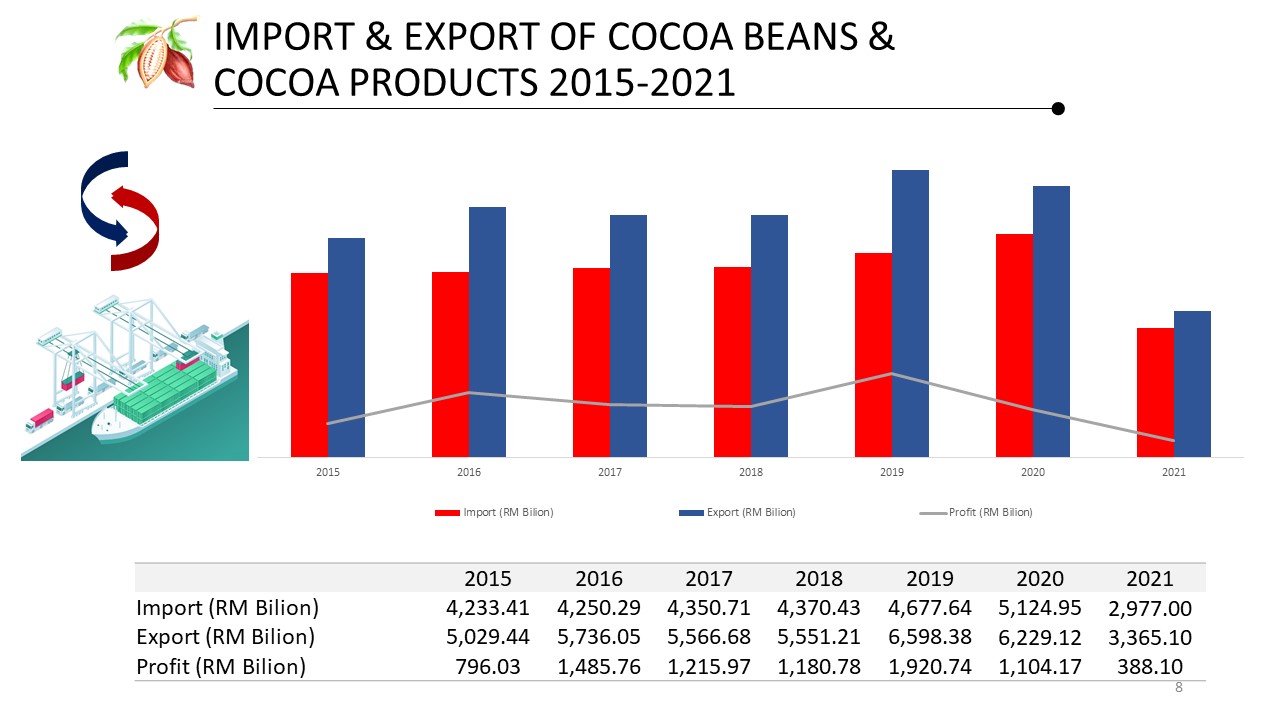
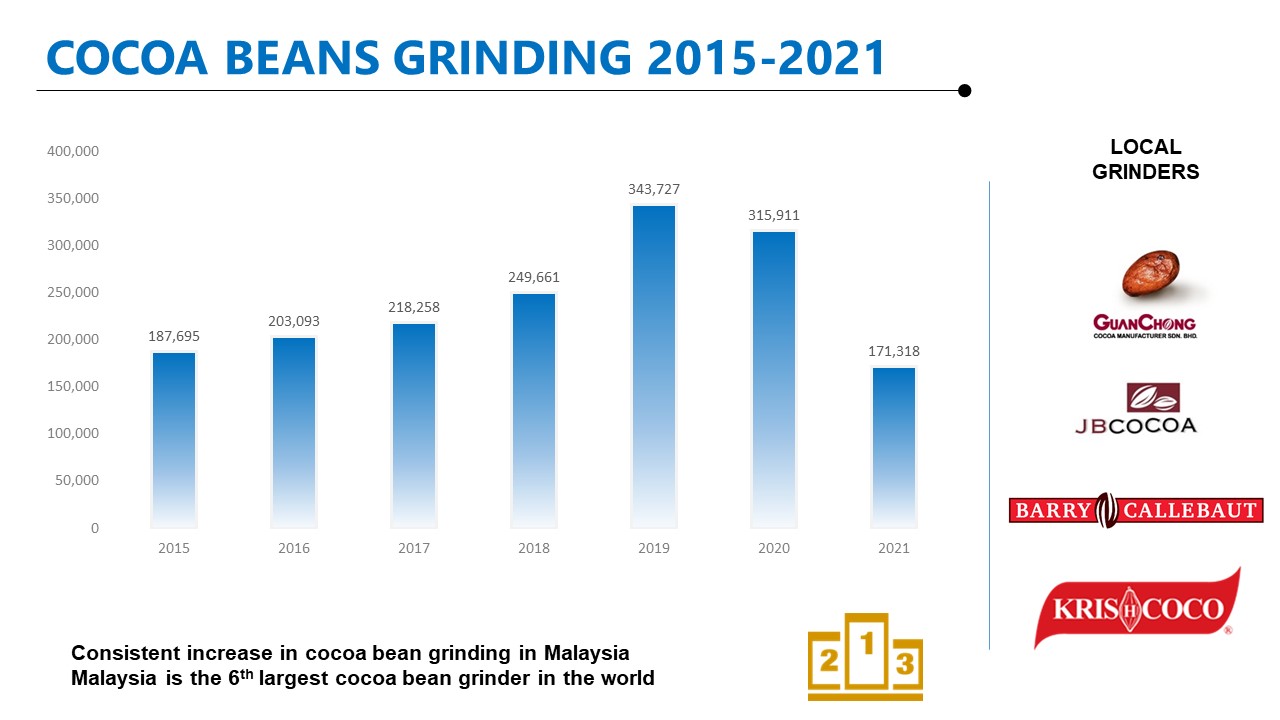
1. What are the activities of the Malaysian Cocoa Board?
Cocoa Cultivation - Advise farmers on cocoa crops & equipment, cocoa seedling nurseries, crop protectors, planting site preparation, fertilizers, weed control, pruning, rehabilitation, pest management, cocoa disease management, pesticide spraying, vertebral animal management, pod harvesting and breaking, cocoa bean quality control, marketing and also as a reference on the total cost and profit in cocoa cultivation.
Development of Body Cleansing Products - Discoveries
i.Antibacterial cocoa hand soap,
ii.Antibaterial cocoa bath soap,
iii.Antibacteria body scrub; and
iv.Antibacteria body cream.
"Anti -Cancer" Research - Research on "cocoa tissue" to be used as a cure for cancer.
Food Biotechnology - Produces high quality cocoa and in turn prevents the safety of cocoa products.
2. What are the incentives provided by the Malaysian Cocoa Board to cocoa growers?
Cocoa orchard cleaning, 1000 cocoa seedlings per hectare (provided by MCB and nursery entrepreneurs), fertilizers, pesticides, banana trees as protectors, tools (pruning, harvesting), courses and others.
3. What are the incentives provided by the Malaysian Cocoa Board to handmade chocolate entrepreneurs?
Courses, molds, scrapers, aprons and invitations to chocolate fairs/sales.
4. What are the types of chocolate produced by the Malaysian Cocoa Board?
"Prebiotic“ Chocolate - High in nutrition, has no sugar content (suitable for diabetics) and works in intestinal cleansing.
"Anti -Oxidant" Chocolate - Tastes like dark chocolate. Anti-Aging, reduces cholesterol, balances the glucose content in the body, prevents toxins in the liver and also acts as the body's defense mechanism (antibodies).
"Praline" Chocolate - Prepared from chocolate couverture block, prebiotic block, anti -oxidant block and milk compound block.
5. What are the courses conducted by the Malaysian Cocoa Board?
i.Basic Cocoa Technology Course - (3 days 2 nights) - Free
ii.Advanced Cocoa Plant Technology Course - (3 days 2 nights) - Free
iii.Handmade Chocolate Introduction Course - (1 day) - Free
iv.Basic Handmade Chocolate Entrepreneur Development Course - (2 days) -RM250
v.Advanced Chocolate Course - (4 days) - RM1900 (Discount for entrepreneurs under the supervision of MCB)
6. When is the Chocolate Course held?
Please refer the course schedule on the official website of the Malaysian Cocoa Board
7. When Program Khidmat Sokongan Pemasaran Domestik (KSPD) is held every month?
Please refer the list of KSPD dates on the official website of the Malaysian Cocoa Board.
For more information on the Cocoa Industry, please contact:
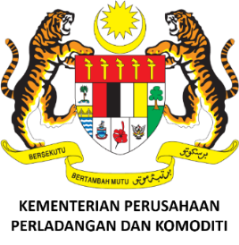
Bahagian Pembangunan Industri Koko dan Lada (IKL)
Kementerian Industri Utama (MPI)
Aras 5, Blok B, Menara Tulus
Persiaran Perdana, Presint 3,
62100 PUTRAJAYA
Telephone No : 603-88921621
Email : ikl [AT] mpi [DOT] gov [DOT] my







